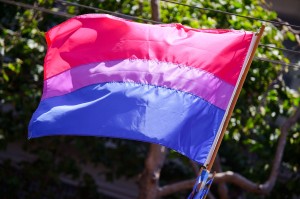screening bisexuality

Written, directed and starring Desiree Akhavan, Appropriate Behaviour (2014) is her debut feature film. Premiering at the Sundance Film Festival in 2014, it didn’t take long for her name to become one of wide acclaim, with the New York Times commending the screenplay as ‘packed with smart remarks [and] clever and unpredictable turns of phrase that knock you off balance’.
The film follows the experiences of a closeted bisexual woman living in Brooklyn, who in the navigating of romance must also—given her traditional Iranian upbringing—keep her sexuality concealed from her family. The film then navigates racial as well as sexual identity, and how the two intercept and interact.
The film’s lead character, Shirin, is largely based on Akhavan herself; who is also bisexual and of Iranian background. When asked in a recent interview about the representation of her sexuality in the media, Akhavan is critical, stating that she doesn’t see bisexuality ‘portrayed in movies and pop culture’ and that ‘there [exists] a bias… a discomfort, it’s taboo.’
The bisexual identity continues to be stigmatised—both within the parameters of heterosexual norms, and within gay communities. Bisexuals are frequently typecast as being ‘on the fence’, as promoting polyamory and promiscuity (with the two often referred to in the same breath), and as being ‘not gay or straight enough’ to fit comfortably—or rightfully—into either demographic.
The hardships faced by gay men and lesbians are unique and deserve continual attention and promotion. However, when it comes to the struggles facing the bisexual community, it seems that less people are willing to speak out, because many are still unsure as to how to correctly define and respond to a sexuality largely perceived as being on the fringes, or as Akhavan sees it, a ‘messy gray area’.
Binaries continue to play a huge part in the way our society is constructed. In a contemporary, post-modern Western world, it seems society has experienced a great divide: that is, people are becoming increasingly aware of the constricting nature of sexual and gender binaries, yet many are still uncomfortable with the idea of abandoning them; thus rejecting or dismissing ‘queerness’ and its representations in popular culture.
This seems, as stated, a puzzling contradiction in a society wherein more and more people are promoting sexual fluidity, declaring themselves hetero- or homo- ‘flexible’, and more generally, embracing sexual liberation as an opportunity to experiment and shed labels now commonly regarded as restrictive.
This openness seems not to translate to actual acceptance of bisexuality, an identity that is still called frequently into speculation. Films exploring the broad spectrum of human sexuality and gender identity are often regarded as niche or tokenistic, rather than depictions of a very real, growing and diverse demographic.
So where exactly is bisexual representation in the media? Bisexuality can currently be said to enjoy more representation in popular cinema and television than ever before. Mass media in general is slowly branching out from its overused criteria of ‘monogamous and heterosexual’.
But quantity does not always translate into quality. Basic Instinct (1992), an incredibly high-grossing Hollywood movie addresses bisexuality, but depicts bisexual women as amoral and hypersexual, cold-blooded killers. Reality television shows such as A Shot at Love with Tila Tequila (2007) presents bisexuality as something titillating and scandalous, not as a serious and complex identity. When gay-centric media like Queer As Folk (2000 – 2005) and The L Word (2004 – 2009), explore bisexual, or more generally, ‘queer’ identity, it often happens in the context of infidelity and promiscuity, typically among women who are not quite ‘gay enough’.
Television series such as the Canadian supernatural drama Lost Girl (2010 – present) explores more profoundly the bisexual identity. Creator Michelle Lovretta, stated her excitement at being asked to create a bisexual protagonist, and to construct a story-world which was ‘sex positive… and where a person’s sexual orientation is unapologetically present’. Similarly, Emily Andras, who was involved for some time in the writing of the program, has stated that she loved writing for Lost Girl, that it gave her an opportunity to explore ‘shades of grey’. But such representations are not the norm and bisexuality is still a largely erased identity, an erasure which is reflected—or rather, not reflected—on the screen.
Desiree Akhavan further discusses the importance of bisexual visibility in an interview conducted earlier this year with Out Magazine. Her creative work is ultimately driven by a political agenda, a desire to ‘speak out about a lot of things that I feel are not spoken about’. For Akhavan personally, the representation of her sexual identity in the popular media has been a source of concern. She has often been presumed gay because of having had female partners, and conversely, speculation regarding her attraction to women has arisen when she becomes involved with a man.
This erasure of bisexual identity, and this bisexual ‘invisibility’ is nothing new. Akhavan asserts that if society’s attitude to bisexuality is ever to ever undergo a progressive shift, positive media representation is integral. She remains committed to ‘making work that tells the story of what it means to be in the middle [between gay and straight]’.
In order for the bisexual community to feel validated, comfortable and accepted in their sexuality, it is imperative that the media represents their sexuality in a meaningful and diverse way. As Akhavan states: ‘We respond to what’s visible and what’s in front of our face and that’s why film is such a powerful medium—for changing minds and humanising gay characters.’ What needs to happen now is for this same principle to be applied to producing more diverse representations of bisexual identity.


Pingback: not just a phase: outrage at speculation over cara delevingne's sexuality | lip magazine